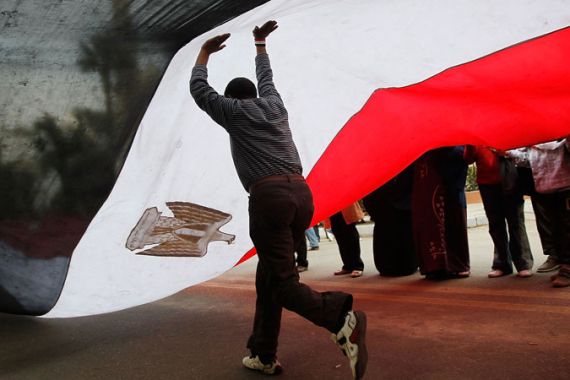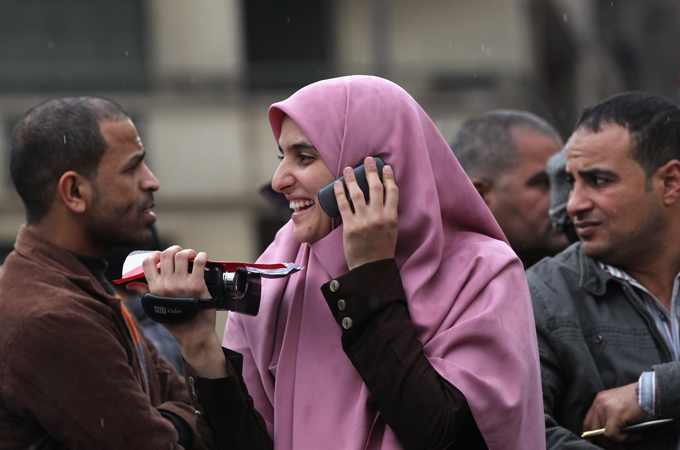Empowered citizens in a post-revolution age
State security personnel are finding it harder to be repressive in an era of open social media.

 |
| Social media sites – such as YouTube and Facebook – are helping to enable protesters, particularly women, to reject traditional power structures in post-revolution Egypt [GALLO/GETTY] |
The men just stand there mute facing the door, their hands in fact covering their faces.
There really isn’t much they can say, even though they should be holding all the cards. This is Egypt, after all, where for four decades – and indeed, for centuries – men who represented the power of the state could basically do whatever they wanted to ordinary subjects or citizens, with no fear of opposition or resistance from their victims.
What could an ordinary person do, never mind a young, slightly built woman, against the power of the mukhabarat [Security Services]? Egyptians, like their counterparts across the globe, had little hope of standing up to the power of the state, whose survival depended in large part on their powerlessness, or at least their perception of their powerlessness against such violence.
But watch this video; watch how Al Jazeera Egypt reporter Hayat El-Yamani refuses to allow the plain clothes security agents trash her office without forcing them to disclose themselves. Watch and listen to how she berates them; how she refuses to let them merely have their way. How her colleague refuses to remove the camera from their faces, how she paces around them, cornering them like a cat does its prey, while they stand pressed against the door to her office.
She challenges them, harangues them, even badgers them with finger jabs to their shoulders and back, forcing them to explain themselves, to admit to the destruction they are engaged in inside the next, temporarily sealed room. “Hey, I won’t stand here and just watch you breaking my own door,” she tells them as she jabs their shoulder, with constantly repeating “law samaht“, or “If you please”, which – under normal circumstances would be a sign of politeness or respect – but here becomes a sign of utter disdain and a reversal of the balance of power that normally exists between citizen and security agent.
“Why are you hiding your faces guys … It’s like you’re being arrested,” she teases them. “If you had the right to do this, you wouldn’t be hiding your face,” she continues. “Let me in my office, I want to see what your guys are breaking and smashing in there… Where’s the documents that says that you have the right to do this?” she demands.
Most important, she declares, “I won’t let this pass. If your guys in there break anything, I won’t let it go.”
What a difference a year makes
This time last year, had El-Yamani been foolhardy enough to do this, she would have faced arrest and quite possibly much worse. Women activists were not merely tortured, but also sexually assaulted. Their balance of power between the citizen and the security system was utterly asymmetrical. Egypt was, to borrow a phrase from the Italian philosopher Giorgio Agamben, one giant “state of exception”, where the power of the government over the masses of people was such that their most basic rights and dignity could be violated with impunity by agents of the state – from the low level police officer or security agent to the president himself – in the name of a “state of emergency” or protecting the “people” (really, their rulers) from any challenge to their power.
Citizens who dared to challenge this system were, quite literally, outside the protection of society, with torture and even death the likely outcome of their position, regardless of what the actual laws said. But as we see in the video, things are now different and so El-Yamani demands legal papers empowering the search of the bureau. Brute force can no longer work without a challenge -at least not at the bureau of the network that televised the revolution.
Cracks in the discourse of exception were already beginning to appear in the latter part of the past decade. Some of the first examples of the revolutionary use of social media technologies involved the use of mobile phone cameras, YouTube and Facebook by activists to record and share video of torture across the internet, which helped bring the brutal realities of the Mubarak regime to the attention of Egyptians across the social, economic and political spectrum.
The blogger-activists who shared these videos often paid for their courage with their own freedom, or worse. And today there are still thousands of Egyptians languishing in jails – without a hint of protest by the foreign allies and patrons of the Egyptian military junta – for daring to expose the truth. But it is undeniable that in the past few years, the synergistic relationship between international satellite networks such as Al Jazeera and social media and video sharing websites changed the balance of power, giving citizens the ability to share the evidence of abuse in a way no state could censor effectively.
In the past year, the example of full transparency offered by Wikileaks further disrobed the emperors, from Washington and Paris to Tunis and Cairo, exposing their lies and corruption to the whole world, and especially their people, to see unfiltered.
This in turn helped empower citizen-journalists, providing the foundation for a social and political counter-force that the Egyptian government could not stop once it was fully unleashed. Particularly once citizens had secured Tahrir Square and Al Jazeera reporters were able to work with activists and other Egyptian and foreign journalists to get the true face of the revolution out to the Egyptian, Arab and global publics. The government narrative didn’t stand a chance.
Watching this latest video, the power of the dynamic that burst to maturity last winter is clear. The goal of the mukhabarat is to keep the state of exception outside of public view, or at least under state control. Previously the government could raid NGOs or activist groups’s offices to find out information that could incriminate their members. But with social media journalist and outlets such as Al Jazeera Mubasher, their intention is to make public what previously was kept in the shadows, or surreptitiously released into the public as a demonstration of state power – rather than a challenge to it.
Mounds of courage
And so the Al Jazeera staff have nothing to fear about what security men might find because they have nothing to hide. And if the mukhabarat succeeded in confiscating some footage, others would upload similar footage to the internet soon enough. With a small mobile phone camera and a lot of courage, a reporter can quite literally get in the face of the regime thugs, exposing them to the rest of society.
It is precisely this dynamic that makes the emerging public spheres so much more powerful than the more traditional networks.
Suddenly, it is the mukhabarat and the state they represent who are existing in the state of exception, who are outside the bounds of power and societal protection. One almost feels bad for the security guys cowering next to the door, afraid to show themselves, being yelled at without any means of escape.
Certainly it would be wrong make too much of a celebration of this video. Not just in Egypt, but across the Arab world, governments continue to violate the rights of citizens with impunity – regardless of whether such actions are captured on video or not. Israel similarly has little care for who sees its routine and widespread violations of Palestinian rights, for the reason that, like the Bahraini or Syrian regimes, it is protected by powerful foreign patrons who have, until now, given it crucial support against the people it oppresses.
But here too it is only a matter of time. Political narratives based on lies cannot survive the light of day for too long. The cognitive dissonance is just too great; sooner or later supporters begin to move away from the perpetrators; their actions become too costly to the self-image and strategic position of their patrons and they are forced to confront the oppressed on a more balanced terrain.
In Cairo it might be political crimes that are at issue; in Sidi Bouzid, a friend described how during his recent visit to the local hospital with a severe case of food poisoning, his friend recorded the hospital staff refusing to admit him because he lacked money or insurance. Within minutes of shouting that he’d put the video on YouTube, the Chief of Staff had personally come down to handle his case, begging them not to upload the video onto the internet.
And yesterday, in the office of Al Jazeera Mubasher Masr, a diminutive journalist held the state and its thugs hostage even though it was they who broke into her office. At least for a moment, she took away their freedom to act outside the law. “I won’t let this pass!” she exclaimed. And with the video now circulating globally online, she has made good on her promise, for the whole world to see.
Mark LeVine is a professor of history at UC Irvine and senior visiting researcher at the Centre for Middle Eastern Studies at Lund University in Sweden. He also is the author of Heavy Metal Islam: Rock, Resistance, and the Struggle for the Soul of Islam and the soon-to-be-published An Impossible Peace: Israel/Palestine Since 1989.
Follow Mark LeVine on Twitter: @culturejamming
The views expressed in this article are the author’s own and do not necessarily reflect Al Jazeera’s editorial policy.
